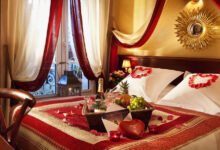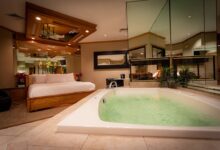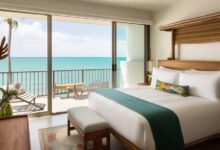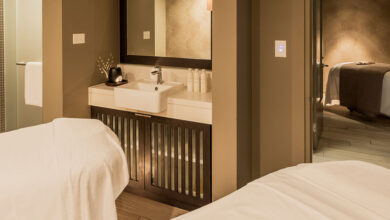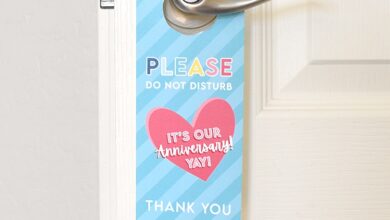Hotel Conference Facilities Your Events Perfect Venue
Hotel Conference Facilities offer a wide range of spaces perfect for any event, from intimate board meetings to large-scale conferences. Choosing the right venue is crucial for a successful event, and hotels provide a convenient and often comprehensive solution, handling everything from catering and AV equipment to accommodation for attendees. This guide explores the diverse options available, helping you navigate the process of selecting and booking the ideal space for your needs.
From the size and configuration of the rooms to the technological capabilities and available services, hotels cater to a spectrum of event requirements. Understanding the different types of facilities, amenities, and booking procedures is key to making an informed decision. We’ll delve into the details, examining various factors to consider, including location, budget, and technological infrastructure, ultimately ensuring your conference runs smoothly and achieves its objectives.
Types of Hotel Conference Facilities
Hotels offer a wide range of conference facilities to cater to diverse needs and group sizes, from intimate board meetings to large-scale conferences. The choice of space depends on factors like the number of attendees, the type of event, and the required technological infrastructure.
Conference Room Sizes and Configurations
Hotel conference rooms vary significantly in size and layout. Smaller rooms are suitable for board meetings or small workshops, while larger spaces can accommodate hundreds of attendees for conferences or presentations. Configurations can be flexible, with options for theater-style seating (rows facing a stage), classroom-style (tables arranged in rows), U-shape (tables arranged in a U-shape for interactive discussions), or banquet-style (round tables for meals and networking).
Many hotels offer adaptable rooms that can be reconfigured to suit different needs using movable partitions or furniture.
Technology in Hotel Conference Spaces
Modern hotel conference rooms are typically equipped with advanced technology to support seamless event execution. Standard features often include high-speed internet access, projectors and screens, microphones, sound systems, and video conferencing capabilities. More advanced setups might incorporate interactive whiteboards, presentation software integration, live streaming equipment, and sophisticated lighting and sound control systems. Some hotels also provide dedicated IT support staff to assist with technical issues.
Many hotels boast impressive conference facilities, perfect for business meetings or large gatherings. However, if you’re planning a family event, you might also want to consider the amenities offered by hotels specifically designed for families, like those found at Family-Friendly Hotels. Returning to conference facilities, remember to check for features like ample seating, reliable technology, and convenient catering options.
Specialized Conference Facilities
Beyond standard conference rooms, hotels often provide specialized facilities designed for specific event types.
Ballrooms
Ballrooms are large, elegant spaces typically used for galas, banquets, and large-scale conferences. They often feature high ceilings, elaborate chandeliers, and spacious dance floors. The capacity can range from a few hundred to over a thousand attendees.
Breakout Rooms
Breakout rooms are smaller spaces used for smaller group discussions, workshops, or smaller presentations during larger events. They often provide a more intimate setting for focused interaction and collaboration. These rooms usually have basic presentation technology.
Boardrooms
Boardrooms are designed for formal meetings and presentations, usually with a large table surrounded by chairs for a smaller group of executives or decision-makers. They often feature sophisticated technology for presentations and video conferencing.
Comparison of Conference Room Types
| Room Type | Capacity | Amenities | Typical Uses |
|---|---|---|---|
| Boardroom | 10-20 | Large table, comfortable chairs, projector, screen, video conferencing | Executive meetings, board meetings, small presentations |
| Breakout Room | 10-30 | Projector, screen, whiteboard, basic sound system | Workshops, small group discussions, smaller presentations |
| Conference Room | 20-100+ | Projector, screen, microphone, sound system, internet access, video conferencing (often) | Presentations, conferences, training sessions, meetings |
| Ballroom | 100-1000+ | Large space, high ceilings, dance floor (often), advanced sound and lighting systems | Banquets, galas, large conferences, weddings |
Amenities and Services Offered: Hotel Conference Facilities
Choosing the right hotel for your conference depends heavily on the amenities and services provided. A successful event hinges not only on the meeting space itself but also on the support and resources available to attendees and organizers. The range of offerings can significantly impact the overall experience and perceived value.Hotels typically offer a comprehensive package designed to streamline the conference process.
This includes aspects beyond just the meeting rooms, encompassing support services that ensure a smooth and efficient event.
Standard Amenities Included in Hotel Conference Packages, Hotel Conference Facilities
Standard amenities are the foundational elements you’d expect from any hotel hosting a conference. These ensure a baseline level of functionality and comfort. These typically include basic internet access, comfortable seating, climate control, and readily available power outlets. More comprehensive packages might include stationery, whiteboards, flip charts, and basic projection equipment. Some hotels also provide on-site staff to assist with setup and basic technical support.
The specific details will, of course, vary depending on the hotel and the chosen package.
Premium Services Offered to Enhance the Conference Experience
Beyond the standard offerings, many hotels provide premium services to elevate the conference experience. These add a layer of sophistication and convenience, often catering to specific needs or preferences. Examples include dedicated event planners who handle logistical details, personalized welcome packages for attendees, high-speed, reliable internet access with dedicated bandwidth for large events, access to advanced audiovisual technology like high-definition projectors and interactive screens, and even concierge services to assist with attendee needs.
Some hotels might offer luxurious catering options, bespoke room setups, or on-site wellness facilities like gyms or spas, to enhance the overall experience.
Catering Options Commonly Available for Conferences
Catering plays a crucial role in a successful conference. The food and beverage choices can greatly impact attendee satisfaction and energy levels throughout the event. Hotels generally offer a variety of options to suit different needs and budgets.
- Breakfast Buffets: A classic choice offering a wide selection of breakfast items to cater to diverse preferences.
- Boxed Lunches: Convenient and easy to manage, perfect for attendees who need to eat on the go.
- Buffet Lunches and Dinners: Provide a variety of hot and cold dishes, often with themed options.
- Formal Plated Dinners: Ideal for more upscale events, offering a refined dining experience.
- Coffee Breaks and Refreshments: Essential for maintaining energy levels throughout the day, often including coffee, tea, pastries, and fruit.
- Cocktail Receptions: A great way to network and socialize, often featuring appetizers and drinks.
Audiovisual Equipment and Technical Support
The availability of appropriate audiovisual (AV) equipment and skilled technical support is paramount for most conferences. Presentations, workshops, and even simple meetings often rely heavily on technology. Hotels usually offer a range of AV equipment rental, including projectors, screens, microphones, sound systems, and video conferencing capabilities. The level of sophistication and the specific equipment available vary greatly between hotels and packages.
Many hotels also provide on-site technical support staff to assist with setup, troubleshooting, and operation of the equipment. This ensures that presentations run smoothly and that any technical issues are addressed promptly.
Planning and Booking a Conference
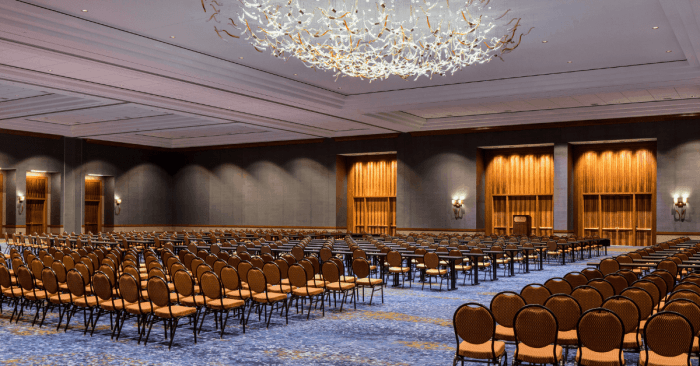
Source: blacklane.com
Securing the perfect venue is crucial for a successful conference. This involves more than just finding a space; it requires careful planning and negotiation to ensure your event runs smoothly and within budget. The process, while detailed, can be managed effectively with a structured approach.
Step-by-Step Conference Booking Guide
Planning a conference requires a methodical approach. Here’s a step-by-step guide to navigate the booking process:
- Define Your Needs: Determine the number of attendees, required space (meeting rooms, breakout sessions, exhibition areas), technical requirements (AV equipment, internet access), and desired dates.
- Set a Budget: Establish a clear budget encompassing venue rental, catering, AV equipment, staffing, and marketing. This helps narrow down suitable options.
- Research Potential Venues: Identify hotels or conference centers that meet your needs and budget. Consider location, accessibility, and amenities offered.
- Request Proposals: Contact shortlisted venues and request detailed proposals outlining costs, available dates, and included services. Compare proposals carefully.
- Site Visits (Optional but Recommended): Visit your top choices to assess the facilities firsthand. This allows you to verify the suitability of the space and discuss specific requirements with the venue manager.
- Negotiate and Finalize: Negotiate the terms of the contract, clarifying any uncertainties and ensuring all aspects align with your needs and budget. Once agreed, sign the contract.
- Confirm Bookings: Confirm all bookings for catering, AV equipment, and other services. Establish clear communication channels with the venue to address any emerging issues.
Key Factors in Choosing a Hotel for a Conference
Selecting the right hotel significantly impacts the success of your conference. Several key factors demand careful consideration:
- Location and Accessibility: Choose a location convenient for attendees, with easy access to transportation (airport, public transport). Consider proximity to accommodation options for out-of-town guests.
- Budget: Establish a realistic budget early on and stick to it. Factor in all costs associated with the venue, including rental fees, catering, and additional services.
- Capacity and Facilities: Ensure the hotel has sufficient space to accommodate your expected attendees, including meeting rooms, breakout rooms, and any necessary exhibition space. Check the availability of appropriate AV equipment.
- Amenities and Services: Consider the availability of essential amenities, such as Wi-Fi, catering options, on-site parking, and business services. The level of service provided by the hotel staff is also crucial.
- Reputation and Reviews: Research the hotel’s reputation by checking online reviews and testimonials from previous clients. This will give you an idea of their level of service and professionalism.
Hotel Conference Booking Contractual Agreements
Hotel conference contracts typically include:
- Dates and Times: Specific dates and times for the conference, including setup and teardown times.
- Venue Rental Fees: Detailed breakdown of rental fees, including any additional charges for specific rooms or services.
- Catering and Services: Specifications of catering services, including menus, pricing, and service styles. Other services, like AV equipment rental, should be clearly Artikeld.
- Cancellation Policy: Clearly defined cancellation terms and associated penalties. This is crucial to understand potential financial implications.
- Payment Terms: Payment schedule, including deposits, installments, and final payment deadlines.
- Liability and Insurance: Clauses addressing liability for damages or injuries during the event. Requirements regarding event insurance might be specified.
Examples of Conference Packages and Costs
Conference packages vary significantly depending on the hotel, the size of the event, and the services included.
For example, a basic package might include a meeting room, basic AV equipment, and coffee breaks for a cost of $500 per day. A premium package might add catered lunches, Wi-Fi access, and dedicated event staff for $1500 per day. A larger conference with 200 attendees and extensive AV needs could cost upwards of $10,000 for a two-day event. These are just examples, and actual costs will vary based on specific requirements and negotiations.
Technological Infrastructure
A modern conference requires robust technological support. Hotels offering comprehensive conference facilities understand this and invest heavily in providing a range of options to meet diverse needs, from small meetings to large-scale events. This ensures seamless presentations, efficient communication, and a positive overall experience for attendees.
Internet Connectivity Options
Reliable internet access is paramount for any successful conference. Hotels typically offer various internet connectivity options, catering to different bandwidth requirements and budgets. These often include wired Ethernet connections, providing the most stable and fastest speeds, ideal for large data transfers and video conferencing. Wireless internet (Wi-Fi) is also standard, usually available throughout the conference space and often offering different tiers of service, such as basic, premium, or dedicated bandwidth packages for higher speeds and capacity.
Planning a corporate retreat? Many hotels offer excellent conference facilities, complete with state-of-the-art technology and spacious meeting rooms. For a truly rejuvenating experience, consider a hotel that also boasts superb spa services, like those offered at Hotel with Spa Services , allowing attendees to unwind after productive meetings. This combination ensures a successful and relaxing event for everyone.
Some hotels may even provide dedicated internet lines for particularly demanding events, guaranteeing bandwidth and minimizing the risk of disruptions.
Hotel conference facilities are crucial for successful business events. Many hotels offer these spaces, but if you’re specifically looking for top-notch amenities and services designed with business travelers in mind, you should check out the selection of Business Hotels available. These hotels often boast state-of-the-art conference rooms and supporting technology, making them ideal for a variety of corporate gatherings and meetings.
Ultimately, choosing the right venue depends on your specific needs and budget.
Audio-Visual Technologies
The range of audio-visual (AV) equipment available varies considerably depending on the hotel and the size of the conference space. Projectors, often high-definition models capable of displaying presentations or video content on large screens, are commonplace. These are usually complemented by motorized screens that retract neatly when not in use. Microphones, including wired lavalier microphones for speakers and wireless handheld microphones for audience participation, ensure clear audio capture.
Many hotels also provide sophisticated sound systems with mixing capabilities to manage audio inputs and ensure even sound distribution throughout the room. Additional equipment might include interactive whiteboards, document cameras for projecting physical documents, and even video conferencing systems for remote participants.
Technical Support Services
Hotels offering conference facilities typically provide technical support services to address any issues that may arise during a conference. This support often includes on-site IT staff who are readily available to troubleshoot problems with internet connectivity, AV equipment, or other technical aspects of the event. This proactive approach minimizes disruptions and ensures the smooth running of the conference.
Many hotels boast impressive conference facilities, offering everything from state-of-the-art AV equipment to spacious breakout rooms. However, increasingly, businesses are prioritizing sustainability, seeking venues aligned with their values; for example, by choosing hotels committed to eco-conscious practices, like those listed on this site: Eco-Friendly Hotels. This focus on eco-friendly options ensures the conference’s impact on the environment is minimized, further enhancing the overall experience.
Many hotels also offer pre-conference technical checks to ensure all equipment is functioning correctly and that the setup meets the client’s specific requirements. Emergency contact information is usually provided to attendees in case of any technical difficulties.
Many hotels boast impressive conference facilities, perfect for business meetings and events. However, if you’re looking to combine work with relaxation, consider the stunning options available at beachfront hotels; check out some amazing choices at Beachfront Hotels. These venues often offer equally impressive meeting spaces, providing a unique and inspiring setting for your next conference.
Technology Packages
Hotels often package their technology offerings into different tiers to cater to various budgets and needs. The following table illustrates example packages:
| Package Name | Internet | Audio-Visual | Support |
|---|---|---|---|
| Basic | Wi-Fi (Basic Speed) | Projector, Screen, Microphone | Basic On-site Support |
| Standard | Wi-Fi (Premium Speed), Wired Ethernet | Projector, Screen, Wireless Microphones, Sound System | Dedicated On-site Technician |
| Premium | Dedicated Internet Line, Wi-Fi (Premium Speed), Wired Ethernet | High-Definition Projector, Large Screen, Multiple Wireless Microphones, Advanced Sound System, Video Conferencing System | 24/7 On-site Technical Support Team |
| Enterprise | Dedicated High-Bandwidth Internet Line, Multiple Wi-Fi Access Points, Wired Ethernet throughout | Multiple High-Definition Projectors, Large Screens, Wireless Microphones, Advanced Sound System, Video Conferencing System, Interactive Whiteboards, Document Cameras | Dedicated Technical Team with Pre-Conference Setup and Ongoing Support |
Marketing and Promotion of Hotel Conference Facilities
Successfully attracting conference organizers requires a multi-faceted marketing approach that showcases a hotel’s unique selling points and effectively reaches the target audience. Hotels need to demonstrate not just the availability of space, but also the overall experience and value they provide for event planners. This involves a strategic blend of traditional and digital marketing techniques.Hotels utilize a variety of marketing materials to attract conference organizers.
These materials aim to highlight the unique aspects of their conference facilities and services, thereby differentiating them from competitors.
Examples of Marketing Materials
Hotels employ a range of marketing materials to showcase their conference facilities. These include professionally designed brochures and catalogs that feature high-quality photographs of meeting rooms, breakout spaces, and common areas. These often include detailed floor plans, technical specifications, and capacity information. Virtual tours, accessible via the hotel website or dedicated platforms, offer a more immersive experience, allowing potential clients to explore the facilities from the comfort of their own offices.
Finally, short, impactful videos highlighting the hotel’s amenities and services are increasingly popular, conveying a sense of ambiance and professionalism. These videos often showcase satisfied clients and successful past events.
Strategies for Highlighting Conference Facilities and Services
Effective marketing strategies go beyond simply listing features; they focus on demonstrating the benefits those features provide. Hotels emphasize the convenience of on-site amenities, such as catering options, business centers, and recreational facilities, highlighting how these contribute to a productive and enjoyable conference experience. They often showcase testimonials from previous clients, emphasizing positive experiences and successful events. This social proof builds trust and credibility.
Furthermore, hotels may offer special packages or incentives tailored to specific types of conferences or organizations, such as academic conferences, corporate retreats, or industry events. These targeted offers increase their appeal to specific segments of the market.
Leveraging Online Platforms for Promotion
The internet is a crucial tool for promoting hotel conference facilities. Hotels actively utilize their websites to showcase their spaces with detailed information, high-resolution images, and virtual tours. They often integrate online booking systems for seamless event planning. Search engine optimization () ensures their websites rank highly in search results for relevant s, such as “conference hotels [city name]” or “meeting rooms [city name]”.
Social media platforms, such as LinkedIn, Twitter, and Instagram, are used to share updates, engage with potential clients, and showcase successful events. Paid advertising campaigns on these platforms further extend their reach to targeted audiences. Finally, participation in online travel agencies (OTAs) and conference booking platforms increases visibility and accessibility to a broader range of potential clients.
Compelling Features to Emphasize in Marketing Materials
To effectively market their conference facilities, hotels should highlight features that are valuable to conference organizers. A list of compelling features to emphasize includes:
- Flexible Meeting Spaces: Highlight the adaptability of rooms to accommodate various event formats and sizes.
- State-of-the-Art Technology: Emphasize high-speed internet, audio-visual equipment, and interactive presentation tools.
- Exceptional Catering Services: Showcase diverse menus, catering options, and experienced culinary teams.
- Convenient Location and Accessibility: Highlight proximity to transportation hubs, airports, and local attractions.
- On-Site Amenities: Showcase fitness centers, spas, restaurants, and other amenities that enhance the attendee experience.
- Dedicated Event Planning Team: Emphasize personalized service, support, and expertise in event management.
- Competitive Pricing and Packages: Offer attractive pricing structures and value-added packages to entice potential clients.
Illustrative Examples of Hotel Conference Spaces
This section provides detailed descriptions of three diverse hotel conference spaces, highlighting their unique characteristics and suitability for various event types. We’ll explore their ambiance, layout, capacity, and overall design to illustrate the range of options available in modern hotel conference facilities.
The Grand Ballroom: A Classic Setting for Large Events
The Grand Ballroom at the fictional “Regal Grand Hotel” is a truly magnificent space, perfect for large-scale conferences, galas, and weddings. Imagine soaring ceilings adorned with intricate crystal chandeliers, walls draped in rich velvet, and a polished marble floor reflecting the light. The layout is flexible, accommodating a variety of seating arrangements, from theater-style seating for up to 1000 attendees to a banquet setup for 700 guests.
Its classic elegance, coupled with state-of-the-art technology seamlessly integrated into the design, creates an unforgettable atmosphere. The ballroom’s ample pre-function space allows for comfortable registration, networking, and catering.
The Lakeside Boardroom: An Intimate Setting for Executive Meetings
In contrast to the grandeur of the ballroom, the Lakeside Boardroom at the fictional “Serenity Lake Resort” offers an intimate and sophisticated setting for smaller, more exclusive events. Located overlooking a tranquil lake, this boardroom boasts floor-to-ceiling windows that flood the space with natural light. The calming view fosters creativity and collaboration. The room is designed with a U-shaped table arrangement, ideal for brainstorming sessions and interactive discussions involving up to 20 participants.
The interior is modern yet refined, featuring sleek, minimalist furniture and neutral tones that create a calming atmosphere. High-speed internet access and advanced audio-visual equipment are, of course, readily available.
The Modern Conference Center: A Versatile Space for Diverse Needs
The “Innovation Hub” conference center at the fictional “TechTower Hotel” is a testament to modern design and functionality. This space is highly adaptable and caters to a diverse range of events, from product launches and workshops to training sessions and seminars. The open-plan layout, with movable partitions, allows for flexible configurations to suit any event size, from intimate breakout sessions to large plenary presentations.
The architectural style is contemporary, characterized by clean lines, natural light, and sustainable materials. The use of innovative technology, including interactive displays and advanced presentation systems, enhances the overall experience. The space comfortably accommodates up to 300 people in a theater-style setting.
Architectural Style and Interior Design of a Luxury Hotel Conference Facility
The fictional “Palace Royale Hotel” exemplifies luxury in its conference facilities. The architectural style is neoclassical, featuring elegant columns, high ceilings, and ornate moldings. The interior design seamlessly blends classic and modern elements, incorporating rich fabrics, plush carpeting, and custom-designed furniture. Natural light streams through large windows, illuminating the space, while subtle lighting enhances the ambiance. The use of high-quality materials, such as marble and polished wood, adds to the luxurious feel.
The overall design aims to create a sophisticated and inspiring environment for attendees.
Visual Appeal and Functionality of a Modern Hotel Conference Center
The visual appeal of a modern hotel conference center, such as the fictional “Cityscape Convention Center,” is defined by its clean lines, open spaces, and abundant natural light. Large windows and skylights create a bright and airy atmosphere, while minimalist décor allows the focus to remain on the event itself. The functionality is enhanced by flexible layouts, advanced technology, and ergonomic furniture.
Modular partitions allow for easy customization of the space, while high-speed Wi-Fi and integrated audio-visual systems ensure seamless connectivity. The design prioritizes comfort and productivity, creating a space that is both visually appealing and highly functional.
Final Summary
Planning a successful conference involves careful consideration of many factors, and the choice of hotel conference facilities plays a pivotal role. By understanding the various options available, from the types of rooms and amenities to the technological infrastructure and booking process, you can ensure your event meets its goals. Remember to factor in your budget, guest needs, and desired atmosphere when making your decision.
With thorough planning and the right venue, your conference is sure to be a resounding success.
Key Questions Answered
What is the typical cancellation policy for hotel conference bookings?
Cancellation policies vary widely depending on the hotel and the specifics of your contract. It’s crucial to review the policy carefully before signing any agreements. Penalties for cancellations often increase closer to the event date.
How far in advance should I book a hotel conference facility?
Booking well in advance, especially for larger conferences or during peak seasons, is highly recommended to secure your preferred dates and space. Popular venues often book up months, even a year or more, in advance.
What are some common hidden costs associated with hotel conference bookings?
Hidden costs can include service charges, parking fees, internet usage beyond a basic package, and additional charges for specific AV equipment or technical support beyond the standard package. Carefully review the contract for all potential charges.
What types of catering options are usually available for dietary restrictions?
Most hotels offer a range of catering options to accommodate various dietary needs, including vegetarian, vegan, gluten-free, and allergy-friendly choices. Discuss your requirements with the hotel’s catering team during the planning stage.



